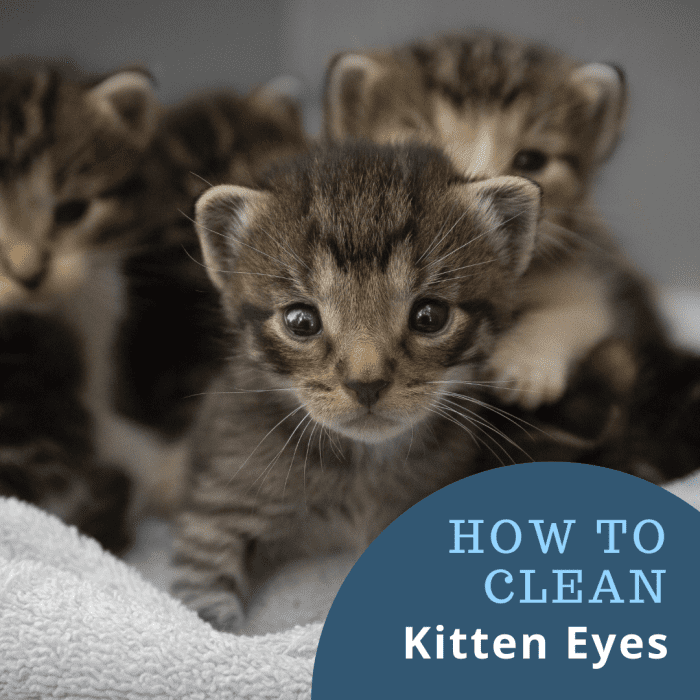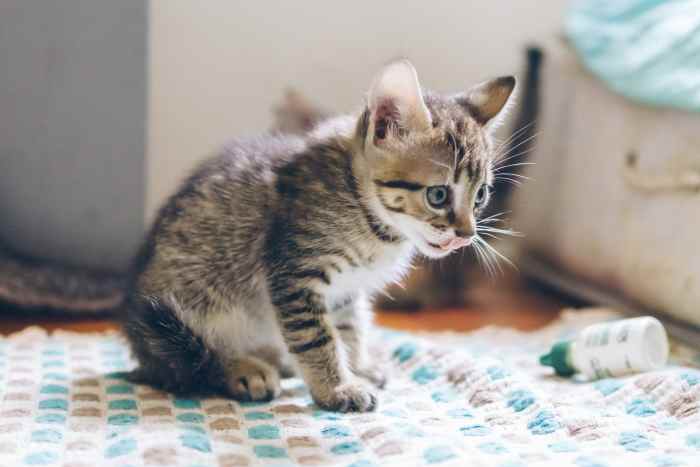how to clean kittens eyes
Updated date:
How to Clean Kitten Eyes That Are Matted Shut
Layne has fostered kittens and worked in animal shelters for over 8 years.

Tips for keeping kitten eyes clear and clean.
Q'AILA
Eye Infections in Newborn Kittens
Kittens are absolutely adorable. Unfortunately, they are prone to respiratory and eye infections because of their fragile state, especially if they are in a high-stress environment such as an animal shelter. Being someone who has both fostered orphaned kittens and worked in animal shelters for over 6 years, keeping kitten eyes clean is an important task.
First, you'll need to rule out or confirm signs of an infection. Symptoms of an infection might differ from standard discharge, matted eyes, and eyes that are crusted shut from lack of grooming by a mom cat.
Symptoms of URIs in Kittens
- Eye and nasal discharge (green, yellow, brown, pus)
- Sneezing
- Crusty eyes
- Eruptions (feline herpes virus)
- Lethargy, weight loss, fever
- Diarrhea and poor appetite
- Conjunctivitis, redness, swelling
If your kitten is fading, take them to your overseen veterinarian right away.

Your vet or a shelter vet may prescribe antibiotics depending on the severity.
Danilo Batista
How to Clean Kitten Eyes
You may read about a lot of different remedies online like green tea bags for kitten eye infections and various remedies for cleaning them, but there are only a few things you should be using: cotton balls and eyewash or distilled water.
Cleaning Supplies
- Cotton Balls: Gauze, blankets, and cloths are too abrasive on the eyes. You should only be using soft cotton balls to clean crusty eyes.
- Distilled Water: The quality of tap water is unpredictable, and it is not sterile. There are trace minerals, metals, and chemicals in our water. Go for distilled water OR
- Sterile Eyewash: I've used Tomyln Sterile Eyewash for cats and dogs. You can buy it online and likely in pet stores. You want your eyewash to be sterile and cat-safe or else you're not helping but potentially exacerbating the eye issues.
Optional Supplies
- Clean, disposable latex or nitrile gloves (powder-free)
How to Wipe Kitten Eyes Using Proper Technique
It is important to mention that you do not want to cool down your kitten's body in this process. Too much cold water on a kittens face can drop their body weight so fast that it puts them at risk of further illness or hypothermia. You can passively warm distilled water but never make it so hot that it will burn. Room temperature is ok or lukewarm. Test it on your wrist first.
How to Clean Crusty, Matted Kitten Eyes
- Gather your supplies. If you have clean gloves put them on.
- Technique A. Pour distilled water onto 2–3 cotton balls. Wrap your kitten in a blanket with its head exposed. OR
- Technique B. Wrap your kitten in a blanket with its head exposed and hold the ophthalmic eye solution in your free hand.
- Technique A. Take one soaked cotton ball, squeeze out any excess moisture, and hold it gently over your kitten's crusted eye. As the debris starts to loosen, wipe from your kittens tear duct to the outer edge of the eye (gently wipe in the direction a mom-cat would groom). OR
- Technique B. Using your free hand, secure your kitten, and squeeze several drops over the matted eye. DO NOT TOUCH THE DROPPER TO THE EYE OR YOU WILL CONTAMINATE THE BOTTLE. Wet a cotton ball with the eyewash and proceed to hold the cotton over the kitten's eye; gently wipe from tear duct to outer eye edge (gently wipe in the direction a mom-cat would groom).
- Use clean cotton balls on the other eye—do not spread the infection or bacteria to the other eye. You can even wash your hands or change gloves in between cleanings.
- When you are working with multiple littermates, you want to change gloves and use clean materials between each kitten. You can spread bacteria between kittens if you are not careful.
What Causes Kitten Eyes to Be Matted Shut?
| Cause | Type | Transmission |
|---|---|---|
| Upper Respiratory Infection (URI) | Viral or bacterial | Contact with secretions |
| Feline Herpes or Feline Viral Rhinotracheitis | Viral | Contact with secretions prior to vaccination |
| Conjunctivitis | Viral or bacterial (accompanies URI) | Contact with secretions |
| Feline Calicivirus (FCV) | Viral | Contact with secretions |
| Feline Infectious Peritonitis (FIP) | Coronavirus mutation | Mutation |
How to Prevent Kitten Eye Infections
- Keep their environment clean. Kittens are adorable but messy. They often find ways to use water bowls as play pools, fling clay litter like it's the next best thing, and they even poop in their bedding and continue to play near it. It's a good idea to change out bedding daily. You can do this with towels. Use one side of the towel one day and flip it the next. Clean out water bowls daily. Remove any wet bedding. Keep the litter box clean.
- Make sure they are warm. Give your kittens options for retreat should they need to warm up and cuddle. You can cut out a cardboard box and stuff it with some warm fleece blankets. You can also purchase a covered cat bed. Some fragile kittens may do well with passive warming. At the shelter, we used to fill socks with rice and tie them off and heat them up in the microwave. DO NOT GIVE YOUR KITTENS THERMAL BURNS!
- Separate littermates. In the worst of scenarios, you may have to pull an infectious littermate and separate them. Of course, kittens can fail to thrive if isolated. It is important to give them snuggly stuffed animals and play with them or let them see their littermates. Hopefully, they will be "quarantined" with other littermates and not left alone. You want to stop the spread of infection. This also goes for mixing litters—be very careful.
- Wash your hands. Anytime you are interacting with one litter and you are noticing some eye discharge, do not spread it via your hands to another litter. Wash your hands regularly.
- Vaccinate. Follow vaccination protocols and practice good hygiene and do not share water and food bowls—if you have multiple cats in a house, the kittens should not be sharing with adults until they have been fully vaccinated. Adult cats have a more developed immune system, but they can also catch URIs from your kittens and vice versa.

Provide your kittens with all of the essentials.
Steffen Petermann
When Is an Eye Infection in a Cat an Emergency?
Eye infections in kittens are serious. If you noticed tenderness, redness, swelling, and the inability to thrive, you should check with a veterinarian for prescription ointment or oral antibiotics. Severe symptoms can cause irreversible vision damage, so play it safe and check in with your vet first. Most shelters (if you are fostering) will absolutely provide medications for free—it's part of their duty if they have a responsible foster program in place.
Why Kittens Need Help Grooming
Whereas normally a mom cat would be cleaning the eyes regularly and passing passive immunity to their newborns from nursing, orphaned kittens that are bottle fed or old enough to ween and without a mom cat will need some help with grooming.
It is not uncommon for kittens to have eyes that are matted shut, but respiratory infections and conjunctivitis should be addressed right away and treated by a veterinarian (a vet may give you directions for at-home treatment). Your veterinarian might send them home with something like Clavamox, which is easy to administer orally and helps to wipe out common URIs, or an antibacterial eye ointment. There are other conditions, however, that can cause URIs that one should be aware of—including viruses.
This article is accurate and true to the best of the author's knowledge. It is not meant to substitute for diagnosis, prognosis, treatment, prescription, or formal and individualized advice from a veterinary medical professional. Animals exhibiting signs and symptoms of distress should be seen by a veterinarian immediately.
© 2018 Laynie H
Related Articles
how to clean kittens eyes
Source: https://pethelpful.com/cats/How-to-Clean-Kitten-Eyes-That-Are-Matted-Shut
Posted by: selfancel1979.blogspot.com

0 Response to "how to clean kittens eyes"
Post a Comment